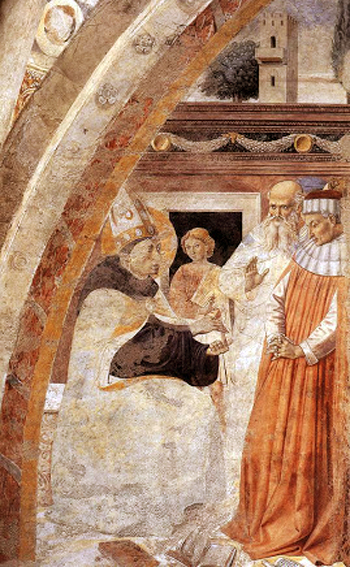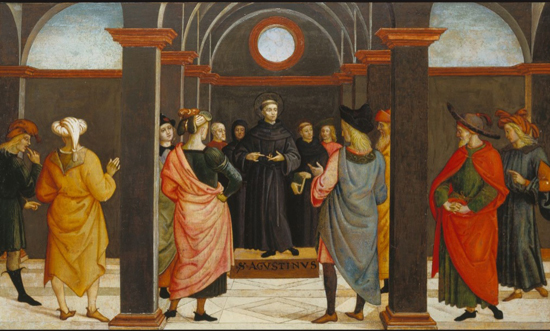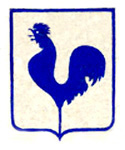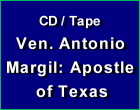Stories & Legends
 |
 |
 |
 |
 |
 |
 |
St. Augustine Shames the Heretic Fortunatus
Now in the city of Hippo at this time, the plague of the Manichaeans had infected and permeated many, both citizens and strangers. They were being seduced and deceived by a certain presbyter of that heresy, Fortunatus by name, who lived and dwelt there.
Meanwhile the Catholics of Hippo came to Augustine and demanded that he should meet the Manichaean Fortunatus, who had a reputation for being a learned man, and argue with him about the Law. This he accepted without hesitation. For, as it is written, Augustine was "ready to give an answer to every man who asked him a reason of the hope and faith that is toward God, and was able by sound doctrine both to exhort and refute the gainsayers."
 But he first sought to learn whether Fortunatus were willing that this debate should take place.
But he first sought to learn whether Fortunatus were willing that this debate should take place.
So, they at once reported the matter to Fortunatus asking, urging and even demanding that he should on no account refuse. But since Fortunatus had previously known the holy Augustine at Carthage, when Augustine himself was still caught in this same error, he was afraid to meet him.
Nevertheless he was greatly urged and shamed by the insistency of his followers and promised that he would meet him face to face and enter the contest of debate.
So, they met at an appointed time and place, where many interested persons and crowds of the curious quickly gathered. When the record keeper's books had been opened, the discussion was begun on the first day and ended on the second.
In this discussion the Manichaean teacher, as the evidence of the record proves, could neither refute the Catholic argument nor could he prove that the sect of the Manichaeans was founded on truth. But failing in his final answer, he declared that he would refer to his superiors the arguments which he had been unable to refute, and if perchance they should not satisfy him on these matters, he would take care for the welfare of his own soul.
After this defeat of the Manichaean Fortunatus, all who had formerly regarded him as great and learned now judged that he had accomplished nothing in the defense of his own sect. Overwhelmed with confusion he left the city of Hippo soon after and returned to it no more.
Thus this error was removed by that memorable man of God Augustine from the hearts of all those present or those absent who learned what had been done, and the Catholic Faith was declared and upheld as the True Religion.


Meanwhile the Catholics of Hippo came to Augustine and demanded that he should meet the Manichaean Fortunatus, who had a reputation for being a learned man, and argue with him about the Law. This he accepted without hesitation. For, as it is written, Augustine was "ready to give an answer to every man who asked him a reason of the hope and faith that is toward God, and was able by sound doctrine both to exhort and refute the gainsayers."

The dispute with the heretic Fortunatus, Chiesa di Sant'Agostino, San Gimignano
So, they at once reported the matter to Fortunatus asking, urging and even demanding that he should on no account refuse. But since Fortunatus had previously known the holy Augustine at Carthage, when Augustine himself was still caught in this same error, he was afraid to meet him.
Nevertheless he was greatly urged and shamed by the insistency of his followers and promised that he would meet him face to face and enter the contest of debate.
So, they met at an appointed time and place, where many interested persons and crowds of the curious quickly gathered. When the record keeper's books had been opened, the discussion was begun on the first day and ended on the second.
In this discussion the Manichaean teacher, as the evidence of the record proves, could neither refute the Catholic argument nor could he prove that the sect of the Manichaeans was founded on truth. But failing in his final answer, he declared that he would refer to his superiors the arguments which he had been unable to refute, and if perchance they should not satisfy him on these matters, he would take care for the welfare of his own soul.
After this defeat of the Manichaean Fortunatus, all who had formerly regarded him as great and learned now judged that he had accomplished nothing in the defense of his own sect. Overwhelmed with confusion he left the city of Hippo soon after and returned to it no more.
Thus this error was removed by that memorable man of God Augustine from the hearts of all those present or those absent who learned what had been done, and the Catholic Faith was declared and upheld as the True Religion.

St. Augustine, center, debates Fortunatus, the blonde man with a black hat, forefront
- Umbrian Master, ca 1500
Excerpt from
Life of St. Augustine, by Possidius,
transcribed by Roger Pearse, Ipswich, UK, 2008
Posted August 29, 2020
transcribed by Roger Pearse, Ipswich, UK, 2008
Posted August 29, 2020



